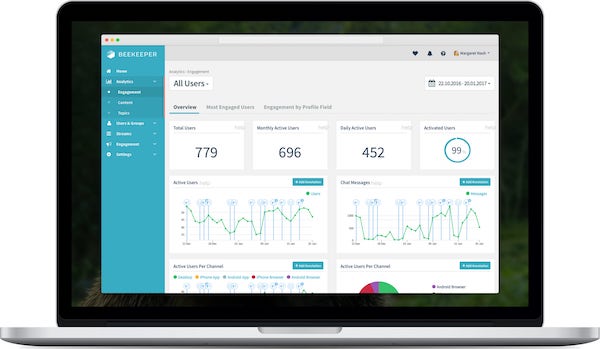As we transition to a new decade, the evolution of the workplace has put employee relations in the spotlight. How employees and employers value one another is a key indicator of business success. A strong relationship delivers better returns.
Companies have been making great strides in this area over the past few years—adopting mobile technology that includes their employees in internal communications and implementing policies designed to improve the employee experience.
Want to build a strong company culture? Get the Employee relations policy template. Download here.
If you’re ready to work on employee relations and don’t know where to start, then you’ve come to the right place.
Here are 15 actionable ways to strengthen the bond with your workforce in 2021.
Pro Tip: Always include frontline workers in employee relations strategies. A mobile team app connects everyone and can help keep these valuable employees happy and engaged.
1) Go Digital
Technology. It needs to be the first move you make when refocusing your strategies to put employees above numbers (and just so we’re clear, when you focus on employees, those numbers will increase.)
A mobile team communications app is a demonstration of trust, transparency, and inclusion. Read on to see why a digital workplace can be a game changer for your organization.
2) Build a Centralized Employee Relations Oversight Team
As you begin to implement strategies to prioritize employees, determine the team that will oversee their implementation, manage conflict resolution, and track the analytics of employee feedback and engagement.
While this is ideally a team made up of HR managers, expand on this idea to create a task force that includes managers that represent different departments for a well-rounded representation of your organization. Meet monthly to brainstorm employee motivation ideas and design strategies based on data gleaned from your digital workplace analytics dashboard.

3) Create Growth and Leadership Opportunities
Companies struggle with how to improve motivation. One great way? incentives. Create growth opportunities for employees. Offer training through your digital workplace that employees can use to improve their skills, like a project management course to teach skills for supervising a construction site.
When employees witness colleagues moving up to management they will be inspired to do the same and stick around to get the training they need to be more valuable to themselves, their families, and the company.
4) Establish Complete Transparency and Open Communication
Here’s what employees want from internal communications: a voice and transparency. Create circular communication economy within your company with a workforce app. Give everyone access. Encourage open communication through a digital workplace and let every employee participate and contribute.
Transparency and communication are key strategies for driving up engagement. Employees simply appreciate being included in messaging. They feel valued as a part of the organization which results in a more loyal and higher-performing workforce.
5) Get to Know What Your Team Truly Wants
Employee satisfaction comes down to understanding what employees want and need in order for them to be happy at work. Managers and leaders can use workplace tech, like an employee app, to get feedback with surveys and messaging to make sure employees’ needs are being met.
Create a culture that encourages employee feedback and take action on what you learn from them.
See how Beekeeper helped build a Tight-Knit Company Culture for Wireless Vision
Pro Tip: Survey your employees to see what they need to feel happier and less stressed at work.
6) Make Work Less Stressful
There’s a reason employees take ‘mental health days’ in today’s culture. Employee burnout is real, with nearly a quarter of the workforce at their burnout breaking point.

A compounding effect is creating a lot of pressure on the collective workforce—little free time, making ends meet, raising families, work demands.
Create an environment in your company that reduces stress instead of adding to it.
Things that help employees enjoy their work:
- Friends in the company
- Agency and autonomy
- Recognition
- Good benefits package
- Trust
- Flexible work arrangements
7) Support Your Managers
Managers have a huge impact on employee retention rate and engagement. Managers should be taught to lead with trust and recognition to support employee satisfaction. Give them the support and tools to do that through training, technology, and information.
8) Resolve Issues Quickly
An inevitable element of employee relations is conflict resolution—from discrimination complaints to conflicts between workers. It’s essential to have a process and protocols in place to handle issues swiftly and fairly.
For conflict resolution make sure to:
- Create an environment where employees feel safe to speak up.
- Resolve issues in a timely manner to lessen the impact to workflows and productivity. Lingering issues can also lead to an air of distrust in the workplace that can spread like wildfire.
9) Inspire Employee Advocacy
A company’s reputation used to be built on customer experience alone. Now, more than ever, employees are predominantly shaping a company’s public profile. From word of mouth to online reviews of employers, your workforce creates your image.
Inspire your employees to champion the brand by prioritizing the employee experience and creating an inclusive, transparent workplace. Employee advocacy does wonders for talent recruitment and employee retention strategies, important in this day and age where competition for employees is fierce.
10) Give Feedback
Create a system of checks and balances in your company by being a champion of constructive, two-way feedback. Through a digital workplace and in person, employees and managers can develop a back-and-forth for constant personal and operational improvement.
11) Make Decisions Based on Data

Today’s workplace technology makes it impossible to claim ignorance when it comes to employee engagement. Detailed analytics are available to track and monitor what’s working in an organization, where employees are most productive, and areas (and people) that need more support. Make data-driven policy decisions and implement strategies that drive results.
12) Retention Begins at Onboarding
When your strategizing and brainstorming employee retention ideas, start at the beginning. Onboarding should be an exciting time for new employees.
Start thinking of retention the day an employee accepts the job offer: be transparent from the get-go and tell them about what they’ll be doing and opportunities for movement within the company. Pair them with a mentor to build their work community from day one. Welcome them and make them happy to be there from the start.
13) Create a Safe Workplace for Everyone
The headlines are filled with long-overdue news stories about workplace discrimination, harassment, and abuse. It is imperative that leaders create a safe space for every single employee, from top to bottom.
Have a zero tolerance policy for any acts that make an employee uncomfortable or scared and take action immediately.
Nurture a community of respect and a culture of diversity and inclusion. Not only will your employees be happier but they’ll be more productive and innovative when they are welcome, supported, and cared for.
14) Hand Over the Reins
When you hire an employee to fill a specific role, give them space to own their title. Let employees make decisions, and let them set goals for accomplishing tasks. Equip them with the freedom, the tools, and information to be self starters.
Build a rapport that encourages them to seek guidance without micromanaging them. They’ll gain confidence, expand their capabilities, and work harder when they see what they can accomplish.
15) Be More Adaptable
By now, you’ve hopefully said goodbye to a strict 9-5 policy. (If you haven’t, then move this to action item to the top of the list.) It’s all about flexible work arrangements now. It ties into so many other areas of employee relations, like reducing stress in the workplace, autonomy, and retention.
Let employees manage their own schedule on the employee app and coordinate with peers to build a schedule that works with their lives. As long as their work gets done and is done well, be adaptable and agile.
As we move into the third decade of the 21st Century, leaders are shifting their efforts to focus more on the well-being of their employees and their role in business success.
Incorporating workforce technology solutions with strategic initiatives can forge a partnership with employees built on trust and transparency. Make sure employee relations is on your list.
Ready to optimize the employee experience for your workforce? Download our Employee Relations Policy Template.
Most Frequently Asked Questions
1) Go Digital
2) Build a Centralized Employee Relations Oversight Team
3) Create Growth and Leadership Opportunities
4) Establish Complete Transparency and Open Communication
5) Get to Know What Your Team Truly Wants
6) Make Work Less Stressful
7) Support Your Managers
8) Resolve Issues Quickly
9) Inspire Employee Advocacy
10) Give Feedback
11) Make Decisions Based on Data
12) Retention Begins at Onboarding
13) Create a Safe Workplace for Everyone
14) Hand Over the Reins
15) Be More Adaptable
Always include frontline workers in employee relations strategies. A mobile team app connects everyone and can help keep these valuable employees happy and engaged.




